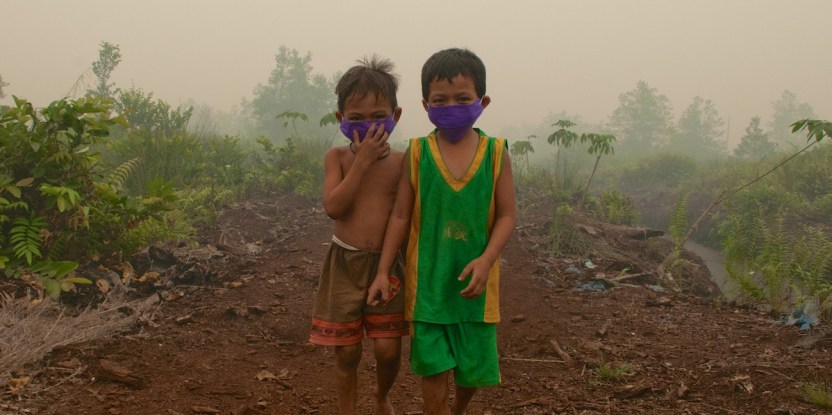Obviously, current agriculture fires on peatlands in the Indonesian archipelago do not fall in this category. They cause, in order of importance, health disasters, displacement of people, food production issues, business disruptions, land degradation, climate impact, political turmoil, and upset international relations.
Clearly, hoses and water bombing are not going to make a key difference to put out the fires (rains will be needed), and no difference at all in addressing the underlying factors.
As repeated many times in recent months, this story repeats itself each year. Another repeating pattern is the rapidly disappearing attention once rains mark the end of the agriculture fire season.
Now, repeating sentiments from earlier years, what can we do to break the cycle of the haze over the long term? How might we address the underlying drivers and achieve sustainable solutions?
To launch a new version of this narrative, I submit that addressing impact on the global climate is not the first priority for solving the crisis, despite the significance of emitted greenhouse gases, as has been quoted in the media. Nor should one have a first focus on biodiversity conservation and the integrity of peatland ecosystems, important as they are.
From a solutions perspective, we may set ourselves up for failure if we start by trying to answer the environmental concerns. It may be more constructive to view reduced impact on climate and environment as a great and much-needed co-benefit to solutions to health, poverty, food and governance issues.
Indonesia - Fire in agriculture is a mixed blessing. A cost-effective tool for poor farmers, fire has been key for food production for millennia. In 2000, vegetation fires covered 350 Mha – or about 3% of the global land area – most of which were in Sub-Saharan Africa. The benefits of these fires must be recognized. Indeed, appropriately managed fire has an important role in many landscapes and ecological settings.
Obviously, current agriculture fires on peatlands in the Indonesian archipelago do not fall in this category. They cause, in order of importance, health disasters, displacement of people, food production issues, business disruptions, land degradation, climate impact, political turmoil, and upset international relations.
Clearly, hoses and water bombing are not going to make a key difference to put out the fires (rains will be needed), and no difference at all in addressing the underlying factors.
As repeated many times in recent months, this story repeats itself each year. Another repeating pattern is the rapidly disappearing attention once rains mark the end of the agriculture fire season.
Now, repeating sentiments from earlier years, what can we do to break the cycle of the haze over the long term? How might we address the underlying drivers and achieve sustainable solutions?
To launch a new version of this narrative, I submit that addressing impact on the global climate is not the first priority for solving the crisis, despite the significance of emitted greenhouse gases, as has been quoted in the media. Nor should one have a first focus on biodiversity conservation and the integrity of peatland ecosystems, important as they are.
From a solutions perspective, we may set ourselves up for failure if we start by trying to answer the environmental concerns. It may be more constructive to view reduced impact on climate and environment as a great and much-needed co-benefit to solutions to health, poverty, food and governance issues.
Behavioral change also extends to investors, with reinforced awareness and the involvement of financial institutions being key. Effective prosecution will continue to play a key role. Research, outreach, education, public awareness-raising and capacity development are all important components of the solutions.
Finally and importantly, we will need a partnership for a multi-year program that is inter-disciplinary across the forestry, agriculture, health, finance, law enforcement, large scale business, and education sectors.
Some selected actions to consider include:
- Public investment (fiscal policies to address the needs of rural people, such as schooling, healthcare, job creation, incentives for non-fire agriculture);
- Engagement by banks and financial institutions to curb inappropriate investments (in Indonesia and abroad) by conditioning financial services;
- Deeper engagement with corporations active in large-scale land use;
- Easing bureaucracy and raising the accountability of public institutions;
- Reforms of land-use policies, spatial planning and land tenure;
- Targeted public awareness campaigns (education, TV, media, social networks) to promote sustainable development, alternative technologies/investments in agriculture and enforcement reforms;
- Research the effects (positive and negative) on health, agriculture, businesses under different scenarios;
- Research effects of fire and haze on climate, including aspects other than global warming (such as local cooling);
- Research and pilot effective peatland restoration measures.
Obviously, this is a tall order, but now is the time to decide on ways forward.
Otherwise, this will just be another article that will be quoted in years to come to illustrate a past that lacked political and moral will to find lasting solutions.
Source: CIFOR














